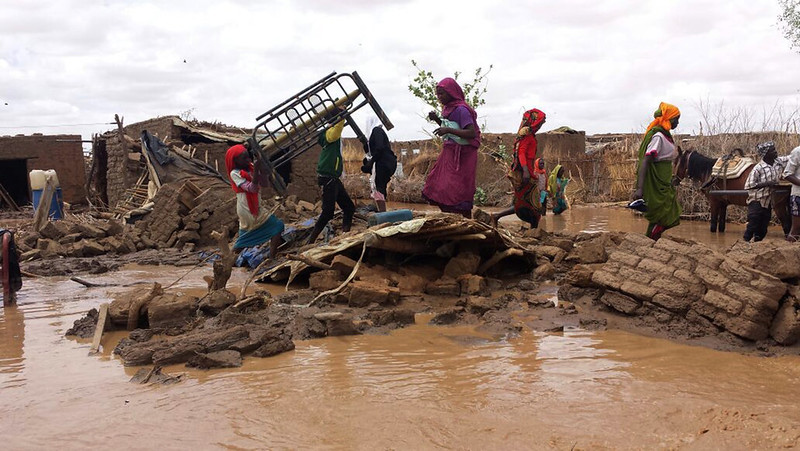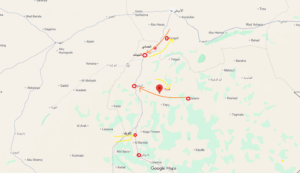Dengue fever, cholera, and measles spreading rapidly in Sudan

Sudan’s annual rainy season often leads to flooding, creating conditions that facilitate the spread of waterborne diseases (File photo: Dar Al Salaam Development Association / UNAMID)
The federal Ministry of Health, working from Port Sudan, capital of Red Sea state, has registered hundreds of suspected cases of dengue fever and ‘watery diarrhoea’ in El Gedaref and El Gezira. Cholera and measles have been reported elsewhere in Sudan.
In a press statement on Sunday, the ministry pointed to the high number of cases of dengue fever in El Gedaref: 542 suspected cases and 300 confirmed cases. In addition, the eastern Sudanese state recorded 197 cases of ‘watery diarrhoea’ (often caused by cholera) in central El Gedaref and adjacent El Galabat West. In addition, 15 suspected cases of dengue fever were reported in El Gezira.
Health sources told Radio Dabanga that the El Gedaref Teaching Hospital, which is already overcrowded, receives 60 suspected dengue cases daily. The laboratory can only test 50 samples of dengue fever a day.
“Most of the hospitals in the state are overcrowded with patients. Others may not even find a place to receive treatment,” the Sudanese Doctors’ Syndicate said in a statement yesterday. They noted that the cumulative casualty and death rate in the state health facilities indicates a “health disaster.”
“The number of dengue fever patients treated at home is many times higher than in the hospitals and health centres. The fever has entered so many homes that investigating the number of infected people is difficult.” The organisation has reported hundreds of deaths and thousands of people infected with dengue fever in the state.
Volunteer Bashir El Sadig said that central El Gedaref and El Galabat West are the worst hit. “The number of dengue fever cases is also increasing among the displaced from Khartoum who are surviving in the various shelters in the city.”
He further said that the hospitals in El Gedaref city are short of blood bags and medicines, along with the money to buy medicines.
Another medical source reported that the platelet separation device at the teaching hospital has broken, which limits the effectiveness of blood donation. He said that the weakness of environmental sanitation, non-payment of salaries to hospital staff for over five months, and lack of medicine are making the situation worse.
Sanitation campaigns
The Wad El Houri Emergency Room, in cooperation with the Wad El Houri Youth Initiative in El Galabat West, carried out a major campaign to combat watery diarrhoea and dengue fever on Saturday.
The campaign included house-to-house spraying operations, posters about environmental sanitation and health education, visits to the neighbourhoods most affected, and drama performances in the streets, with the cooperation of the Sudanese Red Crescent Society, which also provided protection and sterilisation materials.
The Sudanese Doctors’ Syndicate called on the Ministry of Health “to carry out its duty in providing logistical, technical and medical resources to confront the epidemic,” calling for the provision of laboratory diagnostic aids and medicines to help treat symptoms such as intravenous solutions and painkillers, combating the mobile phase, opening temporary ambulance camps to avoid pressure on the El Gedaref Teaching Hospital and setting up and activating health centres according to a geographical plan.
The committee appealed to voluntary organisations working in the field of health to provide medical assistance, health education to the people and environmental sanitation campaigns, and appealed to community members and youth to form support teams working to contribute to the burial, and drying of water ponds, caused by the rains, and spraying campaigns.
Measles
The UN Office for the Coordination of Humanitarian Affairs (OCHA) reported yesterday that 1,000 new cases of measles were recorded last week, bringing the total number of cases across Sudan to 4,334 since April.
OCHA noted that 1,222 refugee children under the age of five died in White Nile state between May 15 and September 12. Most deaths were linked to suspected measles and malnutrition, representing a more than 120-fold year-on-year increase.
The UN Children’s Fund (UNICEF), Médecins Sans Frontières (MSF), Plan International, Save the Children, the UN High Commissioner for Refugees (UNHCR) and the Ministry of Health in White Nile state began a measles vaccination campaign in July.
Some 6,400 children were reached during the first round of the campaign in July, and around 45,500 children under the age of five (equivalent to 107 per cent of the target) were vaccinated during the second round in August, which targeted refugee camps in the state.
Tuberculosis and cholera
The Karari Emergency Room in northern Omdurman announced the resumption of the tuberculosis clinic at El Nau Hospital in El Sawra, which will be open three days a week.
The emergency room noted the availability of tuberculosis pills. Medicines for sexually transmitted diseases will be available again “hopefully next Sunday.”
The Emergency Room of Sharg El Nil (East Nile) in Khartoum North (Khartoum Bahri) reported three deaths, 14 confirmed cases of cholera, and three suspected cases at Alban Jadeed Hospital in East Nile since Friday.
In a statement yesterday, the Sharg El Nil Emergency Room said that laboratory testing confirmed the presence of cholera. 14 people, including four children, are infected.
The emergency room called on the Ministry of Health to “contain the spread of cholera before it turns into a humanitarian disaster,” and appealed to international medical organisations to intervene.
Last week, Radio Dabanga reported that doctors in the North Darfur capital of El Fasher voiced concern at the rising tide of malaria cases, especially among children. Heavy rains have left standing water across the region, an ideal breeding place for mosquitoes, the main vector for malaria and dengue fever.
OCHA reported that during the current rainy season (June-September) more than 72,000 people have been affected by floods and rains in Northern State, Nile River state, North Darfur, North and South Kordofan, White Nile state, and El Gedaref.
Since July, about 6,000 homes have been destroyed, and 6,000 other homes have been damaged.











 and then
and then